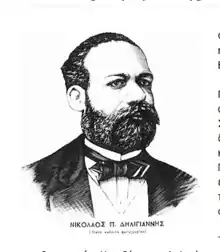Nikolaos Petrou Deligiannis Νικόλαος Πέτρου Δηλιγιάννης | |
|---|---|
 | |
| Caretaker Prime Minister of Greece | |
| In office January 1895 – June 1895 | |
| Preceded by | Charilaos Trikoupis |
| Succeeded by | Theodore Deligiannis |
| Personal details | |
| Born | 12 January 1845 Athens, Greece |
| Died | 5 January 1910 (aged 64) Paris, France |
| Spouse | Amalia Baltatzi |
| Children | Three |
| Occupation | Diplomat, Politician |
Nikolaos Petrou Deligiannis (Greek : Νικόλαος Πέτρου Δηλιγιάννης, 1845, Athens – 5 January 1910, Paris[1])[2] was the caretaker Prime Minister of Greece from January to June 1895.
Biography
Born in Athens, he is the son of Petros Deligiannis, three-time foreign minister of Greece (1841, 1849 & 1863) and spawn of the powerful primate from Langadia, Arcadia.[3]
He studied law at the University of Athens and made his career in the diplomatic corps. He was first appointed secretary of the Greek embassy in Constantinople and then served as ambassador in Belgrade (1881–1885), Paris (1885–1893)[4] and in Madrid. He returned to Athens and after a while he left Paris again, where he was appointed Ambassador of Greece. In 1899 he was a representative of Greece in the Hague Conference. He was also a founding member of the Hellenic Olympic Committee.
In January 1895, after the fall of the seventh and last cabinet of Charilaos Trikoupis, he was appointed by George I as caretaker Prime Minister. The Deligiannis government, composed of extra-parliamentary figures, in which he also held the Foreign and Interior portfolios, conducted elections which took place in May of the same year. They were won by Theodore Deligiannis, a first cousin of his father, who accessed as Prime Minister on 31 May 1895. Nikolaos Deligiannis returned to the diplomatic service as ambassador in Paris, where he died and was buried in the cemetery of Boulogne.[4]
Family
His wife was Amalia Baltatzi, sister of N. Baltatzi, lady-in-waiting, and Elena (Elisa) Baltatzi, wife of Alexandros Tombazis, ambassador in Belgrade. They had three children. Their daughter and a son, officer in the Hellenic Army, had already died when Nikolaos Deligiannis died. The third child, Petros Deligiannis, was also a diplomat, secretary of the embassy in Washington, and Consul at the embassy in Paris in 1890.
He is not to be confused with his cousin Nikolaos Deligiannis (1831–1890), son of Panagos and brother of Prime Minister Theodore Deligiannis, who served as President of the Court of Cassation (Areopagus) in 1885–1890.
References
- ↑ "Ο θάνατος του πρεσβευτού Δηλιγιάννη" [Death of the Ambassador Deligiannis]. Embros (pdf) (in Greek). 6 January 1910.
- ↑ Note: Greece officially adopted the Gregorian calendar on 16 February 1923 (which became 1 March). All dates prior to that, unless specifically denoted, are Old Style.
- ↑ Makrygiannēs, Nikos (1979). Hoi prōthypourgoi tēs Hellados, 1843-1979 (in Greek). Ekdot. Hestia. p. 104.
Biography of Nikolaos Deligiannis (in Greek) Quote in translation: "Nikolaos Diligiannis 1845 - 1910 " Nikolaos Diligiannis was born in Athens in 1845. His origin was from Constantinople and he was the son of Petros Diligiannis named " Greek diplomat and later secretary general" ...
- 1 2 Makrydimitris, Antonis (2000). Οι υπουργοί των εξωτερικών της Ελλάδας 1829-2000 [The Foreign Ministers of Greece 1829-2000] (in Greek). Athens: Kastaniotis. p. 66.